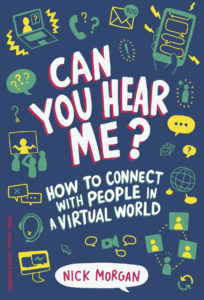 The world is changing, and us with it. We are living our lives 50% in the real world, and the other half in the virtual world. With the internet connecting the two, it’s harder than ever to imagine one without the other. While it seems like we’re more connected than ever, in truth, our communication has become LESS personal. We’re joined today by Dr. Nick Morgan, who discusses the pros and cons of how we connect with people, despite the limitations of virtual communication.
The world is changing, and us with it. We are living our lives 50% in the real world, and the other half in the virtual world. With the internet connecting the two, it’s harder than ever to imagine one without the other. While it seems like we’re more connected than ever, in truth, our communication has become LESS personal. We’re joined today by Dr. Nick Morgan, who discusses the pros and cons of how we connect with people, despite the limitations of virtual communication.
- Dr. Nick Morgan recently wrote a book titled, “Can You Hear Me? How To Connect With People In A Virtual World.” He tells us the story that inspired him to write this book, and how it can change your perception of unconscious communication.
 How is technology making communication worse? Believe it or not, it’s not auto-correct. Nick reveals one of the biggest problems with online communication: people use the same language pattern they use face-to-face, and due to the lack of emotional subtext, we often misunderstand people’s intent. We go on a default “nasty” setting because our brain has filled the gap with negative information to anticipate danger and ‘protect’ ourselves. This is why we’re likely to be less trusting online than we are in the real world.
How is technology making communication worse? Believe it or not, it’s not auto-correct. Nick reveals one of the biggest problems with online communication: people use the same language pattern they use face-to-face, and due to the lack of emotional subtext, we often misunderstand people’s intent. We go on a default “nasty” setting because our brain has filled the gap with negative information to anticipate danger and ‘protect’ ourselves. This is why we’re likely to be less trusting online than we are in the real world.- What makes for effective virtual communication? Nick talks about how our reaction depends on how we’re perceiving the other person – if we default to distrust, our reaction mirrors that. Fortunately, we’re becoming more aware of our behavior online. By extending more empathy and understanding, we’re becoming better adults.
- What’s the benefit of communicating in person? When we meet people in person, it is easier to establish a meaningful connection than we can do online – this takes a lot longer virtually. Nick shares how this is especially useful for first meetings.
- It would seem that despite the ease of communicating online, we are more alone and our relationships have become much harder to maintain. How do we fix this and be better at labeling the emotional undertones in our virtual conversations? It comes down to one thing at a time – a whole bunch of little fixes that focus on being more understanding and a little bit more connected.
- Nick and Laurie talk about how the power of well-placed humor can strengthen online relationships, and the importance of understanding where the overlap lies between the real world and the online world.
Dr. Nick Morgan
Great Post! I am an HR working in a fast-growing IT company. The daily difficulties I faced is that employees in the workspace react to human resource management way different than the old days. For example, people use slack to communicate with each other. As an HR myself, the biggest issue for me is to retain talented employees. Tracking their feedback through employee satisfaction surveys once a year does not work towards my benefit.
Learning to work with technology helped me to get a better understanding of how people are working and reacting to each other. I recommend Slack plugins like Moodbit that sends me regular reports on the team’s emotion through emotion-sensing AI technology.
It’s really helpful to detect the problem immediately and work on it rather than wait until the survey that comes once a year. Take a look: Moodbit (www.mymoodbit.com)